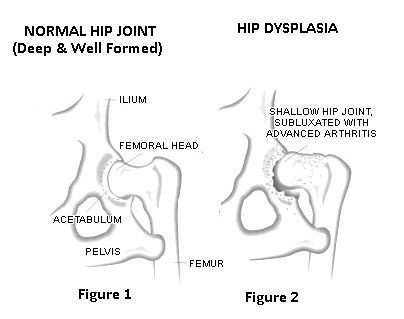The hip joint is a ‘ball and socket’ joint. Hip dysplasia is a disease of the hip joint which causes the joint to develop in an abnormal way, resulting in a shallow socket that the ball does not fit properly into. The shallow, loose joint is then prone to subluxate (partially dislocate). Eventually this condition leads to significant discomfort and lameness and progresses to what is often quite severe osteoarthritis. Risk breeds include Labradors, Golden Retrievers, German Shepherds, Rottweilers, Great Danes, Bernese Mountain Dogs, Saint Bernards, Newfoundlands, Neapolitan Mastiffs, British and French Bulldogs, Basset Hounds, pugs and King Charles Cavalier Spaniels. – Yes, even some small breeds!
 The cause of hip dysplasia is multifactorial – mainly genetic, partly dietary, partly growth related and partly unknown. Purchasing a pup bred from parents that have good hip scores (this is determined by X-ray screening) may help to reduce the chance of getting this problem, but is in no way a guarantee. People are often disappointed when purchasing a pup from parents who have great hip scores, only to find out later their pup has severe hip dysplasia.
The cause of hip dysplasia is multifactorial – mainly genetic, partly dietary, partly growth related and partly unknown. Purchasing a pup bred from parents that have good hip scores (this is determined by X-ray screening) may help to reduce the chance of getting this problem, but is in no way a guarantee. People are often disappointed when purchasing a pup from parents who have great hip scores, only to find out later their pup has severe hip dysplasia.
Hip dysplasia may be suspected (or in very severe cases diagnosed) by palpation for joint laxity (looseness), but requires X-rays of the hip joints under deep sedation or general anaesthesia to definitively determine if hip dysplasia exists. There are many options for treatment of hip dysplasia and these depend on the age of the dog at diagnosis, the severity, and whether or not osteoarthritis is present. ALL dogs diagnosed with hip dysplasia should be desexed due to the hereditary component of this disease.

If you have recently welcomed a puppy into your family, please feel free to contact us to discuss their hips. Early assessment is very important and this is ideally performed between 14-16 weeks of age. Refer to our information on Juvenile Pubic Symphysiodesis (JPS) for more details. For older dogs there are many other medical and surgical options which we can also discuss with you, for advanced cases total hip replacement may be recommended.
